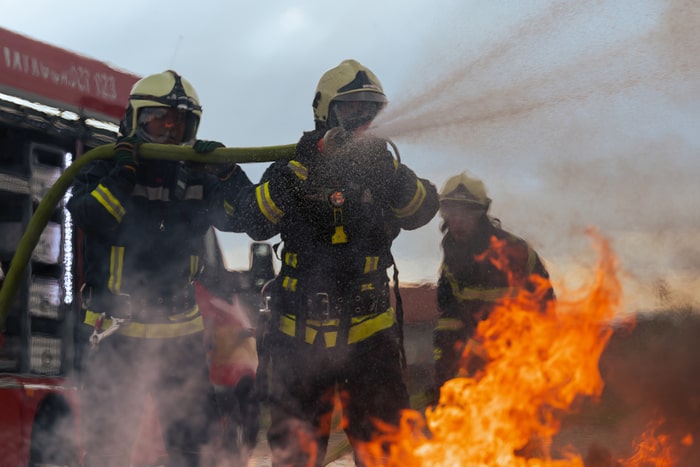
- May 6, 2024
- |security guard company
- | 0
Off-Duty Firefighters in Fire Watch Roles
The psychological impact of fire watch roles on off-duty firefighters is a critical aspect of their experience in safeguarding properties and communities from the threat of fires. While off-duty firefighters bring their expertise and training to fire watch duties, they also face unique challenges and stressors that can affect their mental well-being. In this article, we delve into the psychological impact of fire watch roles on off-duty firefighters, exploring the challenges they may encounter and strategies for supporting their mental health.
Understanding the Psychological Challenges
Off-duty firefighters engaged in fire watch roles often confront a range of psychological challenges that can impact their mental health and well-being. These challenges may include:
1. Constant Vigilance: Off-duty firefighters must remain vigilant and alert during fire watch patrols to detect and respond to fire hazards effectively. The need to stay vigilant for extended periods can lead to heightened stress and fatigue, impacting their ability to concentrate and make sound decisions.
2. Risk Assessment: Off-duty firefighters are responsible for assessing fire risks and implementing preventive measures to mitigate potential hazards. The pressure to accurately assess risks and take appropriate action can create anxiety and uncertainty, particularly in high-risk environments.
3. Isolation: Fire watch duties often require off-duty firefighters to work alone or in remote locations, leading to feelings of isolation and loneliness. The lack of social interaction and support can contribute to feelings of stress, depression, and burnout.
4. Emotional Impact: Off-duty firefighters may experience emotional distress when confronted with the aftermath of fires, including property damage, injuries, and loss of life. The emotional toll of witnessing traumatic events can manifest as anxiety, depression, and post-traumatic stress disorder (PTSD).
Coping Strategies for Off-Duty Firefighters
Despite the psychological challenges they face, off-duty firefighters can employ coping strategies to support their mental health and well-being while performing fire watch duties. Some effective coping strategies include:
1. Mindfulness and Relaxation Techniques: Off-duty firefighters can practice mindfulness and relaxation techniques, such as deep breathing exercises, meditation, and progressive muscle relaxation, to reduce stress and promote mental clarity.
2. Peer Support and Communication: Establishing peer support networks and maintaining open communication with fellow firefighters can provide off-duty firefighters with a sense of camaraderie and solidarity. Sharing experiences, concerns, and coping strategies with peers can foster a supportive environment and reduce feelings of isolation.
3. Physical Exercise and Recreation: Engaging in regular physical exercise and recreational activities can help off-duty firefighters manage stress, improve mood, and enhance overall well-being. Activities such as jogging, hiking, or participating in team sports provide opportunities for relaxation and social interaction outside of work.
4. Seeking Professional Help: Off-duty firefighters experiencing significant psychological distress or symptoms of mental health conditions should seek professional help from mental health professionals, such as therapists or counselors. Professional support can provide off-duty firefighters with the tools and resources they need to address mental health concerns effectively.
Organizational Support and Resources
Fire departments and security companies can play a crucial role in supporting the mental health and well-being of off-duty firefighters engaged in fire watch roles. Some key organizational support measures include:
1. Training and Education: Providing training and education on stress management, resilience, and mental health awareness equips off-duty firefighters with the knowledge and skills to recognize and address psychological challenges effectively.
2. Employee Assistance Programs (EAPs): Offering access to EAPs provides off-duty firefighters with confidential counseling services, referrals to mental health professionals, and resources for managing stress and coping with psychological issues.
3. Peer Support Programs: Implementing peer support programs facilitates peer-to-peer interactions and support networks among off-duty firefighters, promoting a culture of mutual assistance and camaraderie.
4. Wellness Initiatives: Implementing wellness initiatives, such as wellness workshops, fitness programs, and mindfulness sessions, fosters a supportive work environment and encourages off-duty firefighters to prioritize their mental and physical health.
The psychological impact of fire watch roles on off-duty firefighters is a significant aspect of their experience in safeguarding properties and communities from fires. While off-duty firefighters face unique challenges and stressors in their roles, they can employ coping strategies and access organizational support to promote their mental health and well-being.
By recognizing the psychological challenges associated with fire watch duties and implementing strategies to support off-duty firefighters, fire departments and security companies can create a supportive work environment that enhances the resilience and effectiveness of off-duty firefighters in their vital roles. Contact us to request a quote.


